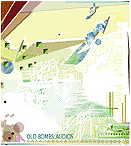|
|
 |
Dusted Reviews
Artist: Old Bombs Album: Audios Label: Soft Abuse Review date: Feb. 24, 2004 |

|
|
|
 |
The cut-up has long been a staple of avant-garde art and literature. The concept is fairly intuitive; simply take phrases from magazines, newspapers, books, etc, cut them up into the individual words, and rearrange them. In a sense, they are the verbalization of collage. They first appeared in 1959 in the poetry of Brion Gysin who wanted to “free the word,” since he felt that literature was 50 years behind painting. His friend, William S. Burroughs, extended the technique, creating systems and hierarchies of different kinds of cut-ups in his so-called “cut-up trilogy” of The Soft Machine, Nova Express, and The Ticket That Exploded. Throughout this trilogy, Burroughs took various elements of pop-culture, science fiction, and literature, cut them up, and juxtaposed them to escape from what he perceived as the mind control inherent in words. Jumping ahead 40 years, the aesthetic of the cut-up has shifted. While there were experiments in tape cut-ups, it was a somewhat cumbersome process that was limited by the equipment available. With the advent of affordable digital editing technology in the recent past, the possibilities of the cut-up are limitless.
So what do a bunch of noise mongers like Old Bombs have to do with cut-ups? The trio of Dino Felipe (one of those Schematic records dudes), Carlos Giffoni (of the group Monotract and a Chris Corsano/Nels Cline/Thurston Moore/etc collaborator), and Vanessa Payes (in Fukktron with Felipe) has been destroying music for about six years over seven CD-R type releases, with Audios acting as their first album proper. Since their inception, their methodology for taking sounds and demolishing them has evolved from a grimier, organic analog style akin to Wolf Eyes (with whom they have a split CD-R) to the precise, structured Valhalla of the digital world.
Here is where the Burroughs comparison proves fruitful. Burroughs’ technique for creating tape cut-ups involved recording something, rewinding the tape to a random point and inserting other bits and pieces. While Old Bombs don’t take quite that tact (their compositions are all meticulously structured and planned), their products are actually surprisingly similar. They take samples, chop them up into minuscule fragments, process them, digest them, disrupt them, reorganize them, and reformulate them into something totally new. And the juxtapositions that result are quite fascinating. Take for instance “Audio 3,” a six-minute exploration through extreme noise and massively acetated samples. A full catalog of all its component parts is way beyond the scope of a simple review, but I’ll cover the highlights. The pieces dares to compare a pop song with video game music, starting with samples from said pop song which gradually get diced into tiny fragments that bounce around the stereo field, mimicking the sounds from the old Nintendo. Then comes the actual Nintendo music, reconfigured to resemble a pop song, with fun, catchy melodies that disappear all too soon. Even this ultimately disintegrates, becoming just a series of sine waves. The effect is rather stunning. And the rest of the album continues in a similar vein.
Even though the tracks were created by sending tapes back and forth between Miami and Brooklyn, the album has a remarkable structural continuity. The tracks are constantly referencing one another, meaning that the listener is never totally in the dark about what’s coming up next. Again, this is a technique that comes from Burroughs who often would interlace text from later pages of a book within earlier ones in his cut-ups. That self-referentiality means that Old Bombs must have had some idea of where they were going and what they were trying to accomplish. And therein lies the key to Audios; without that substructure, this would be nothing but noise with a sense of humor.
“When you cut into the present, the future leaks out.” -- William S. Burroughs
By Dan Ruccia
|







